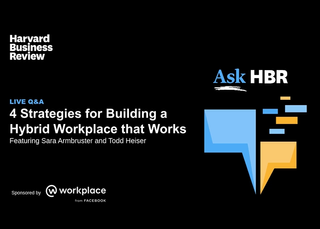Airbnb bucks hybrid work trend with 'work anywhere' policy
Employees can work anywhere across a country or for up to 90 days in another

Airbnb employees can work from "anywhere" across the country they live in and even enjoy up to 90 days of work abroad, according to its new remote work policies.
The update to its remote work position is in stark contrast to most hybrid work trends, with companies offering a certain number of days working from home or, in some cases, none at all.

Four strategies for building a hybrid workplace that works
All indications are that the future of work is hybrid, if it's not here already
In a company blog post, which has also been emailed to employees, Airbnb's CEO Brian Chesky outlined a new five-point policy that allows staff to choose whether they work from home or the office. They can also move anywhere in the country they work, without losing compensation, and also have the "flexibility" to work and travel around the world. The firm will continue to provide regular gatherings and aim to operate in a "highly coordinated way".
For Airbnb employees who want to move, as long as they stay within the country, their pay won't change. However, that isn't the case if they chose to move from the US to another country, as the company uses regional pay structures; London employees are paid differently from those in San Francisco, for example.
Employees can, however, opt to work around the world for up to 90 days. From September they can choose from 170 different countries to travel to, though they will still need a fixed address in their original country for tax and payroll purposes. This will still require authorisation from a line manager as issues like different time zones will need to be taken into consideration.
Airbnb's announcement coincides with new research that suggests people around the world would look for a new job if an employer wanted them back in the office full-time. According to security firm Kastle, this is the case for two-thirds of the global workforce. Its report surveyed more than 32,000 workers from the US, India and Europe, and found 64% had said they would consider a new position if working from home was no longer offered.
Remote working policies have been hotly contested between employees and employers since the onset of COVID-19. This has even been a difficult issue for the technology firms that develop the software and hardware that enables remote working, such as Google and Microsoft.
Get the ITPro. daily newsletter
Receive our latest news, industry updates, featured resources and more. Sign up today to receive our FREE report on AI cyber crime & security - newly updated for 2024.
Within the discourse, though, there have been examples of companies putting remote work at the core of their business models. These include firms like Salesforce, which declared "the 9-to-5 dead" with its flexible working policies and Fujitsu, which, similarly to Airbnb, enabled all of its Japanese employees to work from anywhere in the country.
Bobby Hellard is ITPro's Reviews Editor and has worked on CloudPro and ChannelPro since 2018. In his time at ITPro, Bobby has covered stories for all the major technology companies, such as Apple, Microsoft, Amazon and Facebook, and regularly attends industry-leading events such as AWS Re:Invent and Google Cloud Next.
Bobby mainly covers hardware reviews, but you will also recognize him as the face of many of our video reviews of laptops and smartphones.





